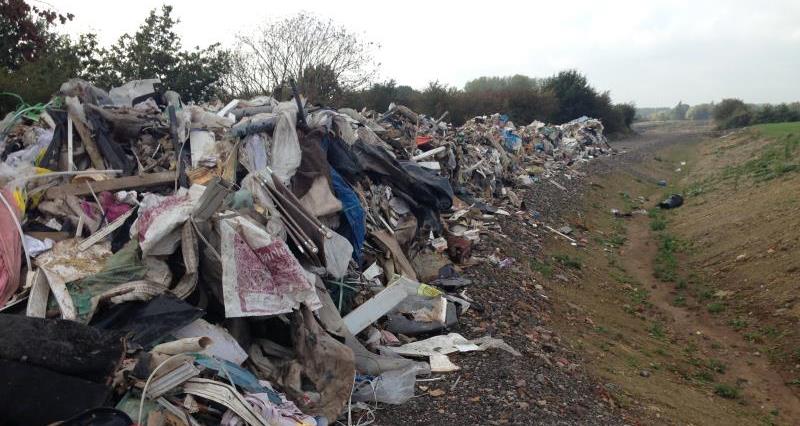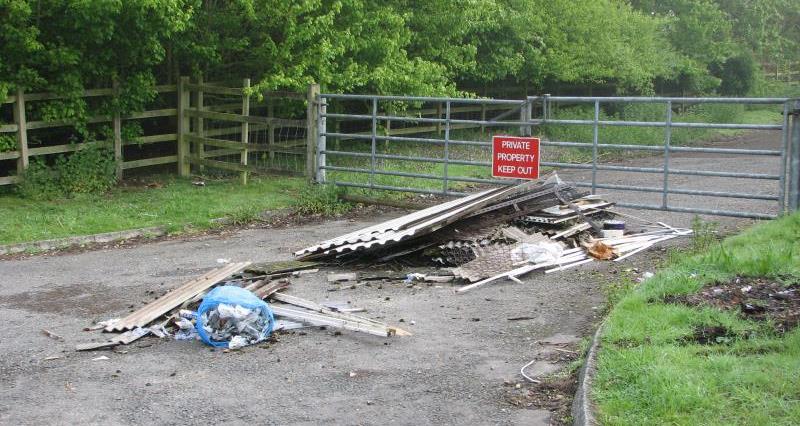The NFU and the National Fly-Tipping Prevention Group have worked together to provide clear advice on how best to deal with fly-tipping on your land.
Although the NFU believe it should not be the sole responsibility of the landowner to deal with this crime, when incidents of fly-tipping take place on private land it is the landowner’s responsibility to remove the illegally dumped waste.
Local councils will not normally clear rubbish dumped on private land free of charge but they may investigate such incidents and where appropriate take enforcement action.
The Environment Agency investigates the larger (more than a tipper load), organised (linked to criminal business practices), or hazardous (waste over 75L which have the potential to damage the environment) incidents of illegal dumping on public land.
Regardless of whether fly-tipping is found on public or private land you should always report it to the relevant local authority – it may be that the culprit can be found or linked to other incidents. Local authorities also report their statistics nationally.
The NFU suspect that many incidents on private land go unreported and the current statistics do not fully reflect the reality of the situation. Therefore, by reporting all incidents we will achieve a more accurate picture of the issue.
What do I with fly-tipped waste on my land?
1) Exercise caution. Some fly-tipped waste can be hazardous. Do not open bags or drums and be aware that piles of soil may be contaminated or hide dangerous material.
2) Record as many details as possible about the waste and when you found it. If possible take a photograph of the waste.
3) Report the incident – do not move the waste or remove any evidence from it until the authorities have been notified.
4) Secure the waste so that it cannot be interfered with or added to.
5) Remember that fly-tippers are doing something illegal – they are unlikely to welcome people observing them. Do not put yourself at risk – if fly-tipping is in progress, call 999.
6) When arranging for disposal, ensure that you use a registered waste carrier, as if it is dumped elsewhere you could be held responsible and face an unlimited fine.
7) Ensure that you get documentation which includes the details of the waste and who is taking it away.
8) If you take the waste to a licenced waste site yourself, make sure you are registered as a waste carrier.
9) If the waste is hazardous then make sure that it is being carried and disposed of by those licensed to deal with hazardous waste.
10) Keep full details of your clearance and disposal costs. Successful prosecution can mean that your costs incurred for the removal of the waste can also be recovered.

How can I protect may land from the illegal dumping of rubbish?
1) Restricting access to your land by installing gates or physical barriers (strategically placed earth bunds, tree trunks, boulders etc.) to prevent access to the land ideally in keeping with the natural environment. Make sure that when erecting any form of barrier you are not permanently blocking a public right of way.
2) Make sure gates are closed and, if possible, locked when not in use.
3) Improving visibility so that fly-tippers are not hidden from view. Fly-tippers prefer to commit their crimes out of sight.
4) Install or improve lighting if possible.
5) Consider placing appropriate deterrent signage and CCTV cameras.
6) Swiftly clear any waste that is dumped to remove any encouragement for others to add to it.
Further information on how to prevent fly-tipping and the Fly-tipping Partnership Framework can be found on the NFTPG website.
The NFU and Crimestoppers have worked together to launch the Rural Crime Hotline. By ringing 0800 783 0137 or visiting www.ruralcrimehotline.co.uk farmers, rural businesses and the public can anonymously give information about rural crime.
